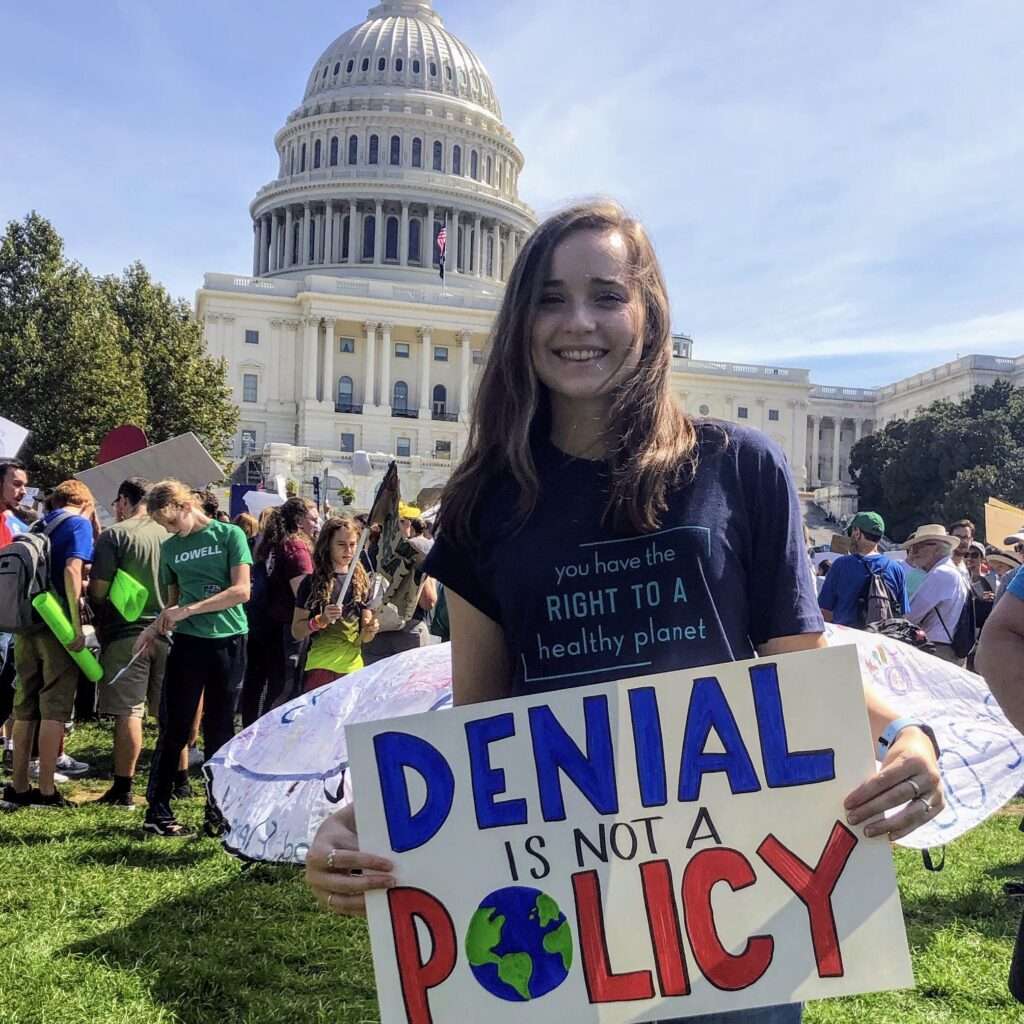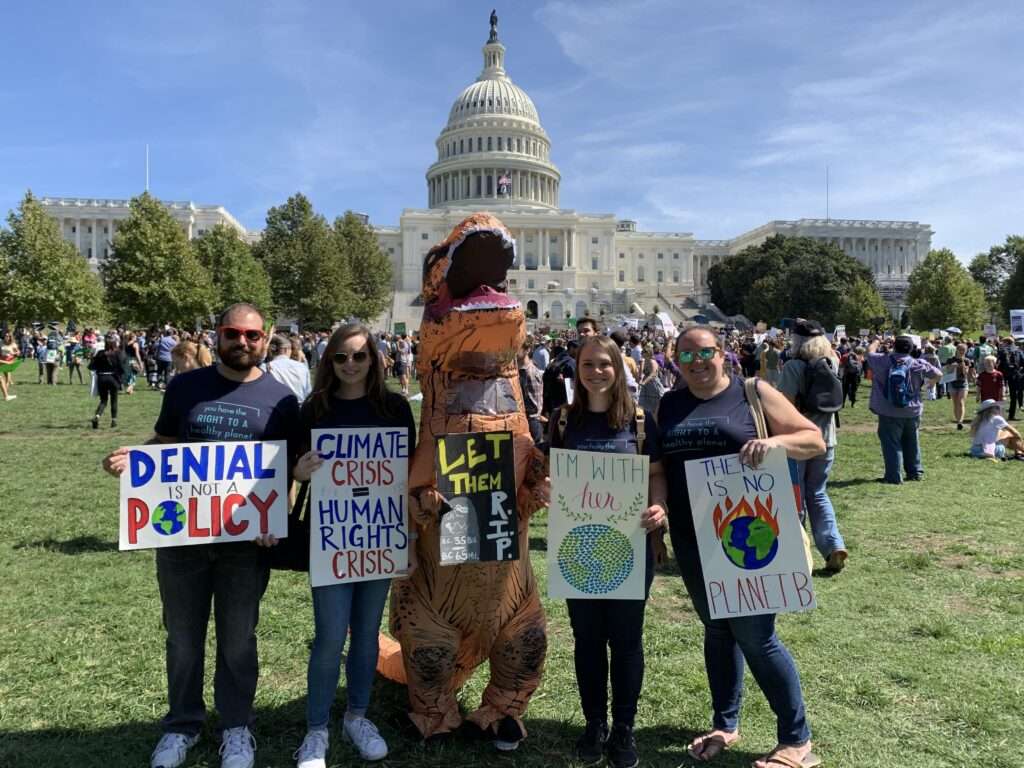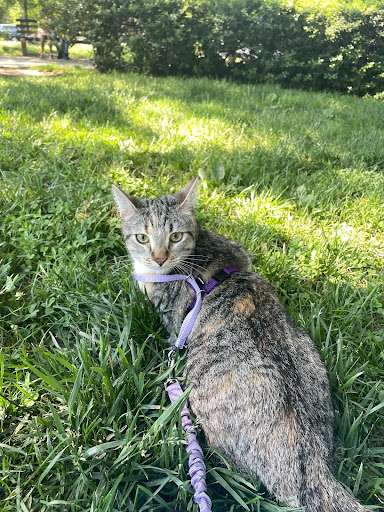
Here at the Center for International Environmental Law (CIEL), we know our strength comes from the people who make up our movement — from our staff, to our partners, to our steadfast supporters. Our “Meet Our Staff” series will introduce you to some of our amazing staff members, who work behind the scenes every day to defend the right to a healthy environment.
Taylor Black is an Associate with the Communications and Development team at CIEL. Originally from Nashville, Tennessee, Taylor joined CIEL after graduating from the University of Georgia with degrees in International Affairs and French. We talked with Taylor about what brought her to CIEL, her work at the organization, what she’s reading right now, and more below.
Q: Given that this is your first full-time job after college, did you always know this was the type of work you wanted to do? What attracted you to CIEL?
Taylor: In college, most of my classes focused on global issues, but I was also interested in getting to know my community in Athens, Georgia. So I started volunteering and working with local nonprofits, focused on everything from environmental education, to gender equality, to food security. I enjoyed those experiences and realized that I wanted to combine my international studies and desire to support communities by working in the nonprofit sector. Then, during a semester exchange in Paris, France, I took a course on climate change security, where we explored many of the connections between human rights and the climate crisis. After that, I was sure that I wanted to pursue a career in environmental protection and human rights, ideally at an international nonprofit. CIEL is one of the very few places at the intersection of all those things!
Q: Did your semester in Paris change your views? How has having that experience abroad informed your work now at CIEL?
T: During my semester in Paris, I studied at Sciences Po, a political science university in the heart of the city. Students there are required to go abroad for their third year, so about one third of the student population was international. This made all the classes incredibly interesting because they included people from all over the whole who brought different perspectives to discussions both in and out of the classroom. In the climate change security class that I mentioned, people would share how their respective countries are addressing — or not addressing — climate change, and how they’re already seeing the impacts of the climate crisis. It was fascinating! Outside of class, I was living on my own in Paris, so I definitely felt like I grew just from experiencing the city and meeting people from around the world. In terms of how it informs my current work at CIEL, the international experience I gained during that semester prepared me well to work at an international organization where my fellow coworkers and many of our partners are from all over the world!
Q: What does your role at CIEL entail?
T: As part of CIEL’s Communications and Development team, my role involves helping to make CIEL’s work more accessible and engaging, as well as supporting fundraising initiatives with both foundations and individual donors. Day to day, I’m one of the folks behind CIEL’s email newsletters, foundation reports and proposals, end-of-year giving campaign, and the annual report, among other things. I also design CIEL’s reports!

Q: What has surprised you most in your work at CIEL?
T: First of all, a really unique perspective I’ve found at CIEL is our recognition not only of the ways that climate change itself infringes on human rights, but also the ways that solutions to climate change can cause harm, particularly if they don’t incorporate local participation. I’ve also been surprised by the breadth of knowledge that CIEL’s staff have. As an organization, we cover everything from climate change, to toxic chemicals, to development finance, and each of our program staff specialize in unique areas of work. Before I started at CIEL, I hadn’t realized some of the connections that climate change has to, for example, plastic production or pesticide use, but CIEL has highlighted many of the intersections that people don’t always consider.
Q: Why do you think the work of the communications team individually and then CIEL as a whole is important?
T: On the communications side, while CIEL’s work is impactful and transformative, it’s not always obvious to the outside world. As a legal organization, our work is wonky and technical, so it’s the job of the communications team to broadcast CIEL’s impact and why we’re doing the work that we do! For CIEL as a whole, one aspect I really admire is that we don’t sacrifice our values for the sake of funding or garnering support; CIEL stays true to our ideals, even if we receive pushback from industry or other organizations. I also think our legal approach distinguishes us because we have evidence and logic to back up our strategies — rather than just saying, “You know, we really should protect human rights and the environment,” we have international legal precedent to support our claims that, for instance, people have the right to a healthy environment.
Q: What book are you reading right now?
T: Right now, I’m reading The God of Small Things by Arundhati Roy and Dune by Frank Herbert, which have both been fantastic. We’re also slowly reading Braiding Sweetgrass by Robin Wall Kimmerer in our CIEL staff book club, and that’s been one of my favorite books so far!
Q: What do you like to do in your free time?
T: Unsurprisingly, I enjoy a lot of outdoor activities, particularly running, hiking, and yoga — or anything involving water. During quarantine, I’ve embarked on a few new hobbies, including trying out new recipes, baking bread, and growing a garden. I also enjoy cuddling with my cat, Zora, and exploring all the different neighborhoods of DC!
Interviewed by Sarah Street, Communications Intern
Originally posted on January 14, 2022


